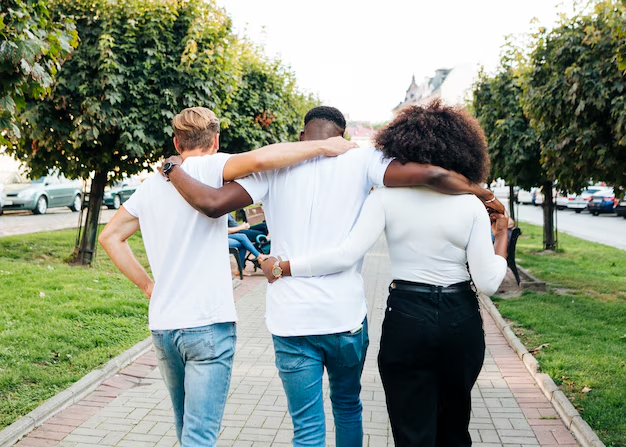Your Guide to How To Make Friends In a New Neighborhood
What You Get:
Free Guide
Free, helpful information about Neighborhood Guides & Community Resources and related How To Make Friends In a New Neighborhood topics.
Helpful Information
Get clear and easy-to-understand details about How To Make Friends In a New Neighborhood topics and resources.
Personalized Offers
Answer a few optional questions to receive offers or information related to Neighborhood Guides & Community Resources. The survey is optional and not required to access your free guide.
Finding Friends in a New Neighborhood: Your Guide to Settling In
Moving to a new neighborhood can feel like charting unfamiliar territory. You may feel isolated amid unfamiliar streets and strangers' faces. But with a little effort and an open mind, building lasting friendships can transform your new environment into a warm and welcoming home. Here’s how to proactively connect with your neighbors and make meaningful friendships.
Start with a Friendly Gesture
Breaking the ice is often the hardest part of making new friends. Begin by introducing yourself with a warm smile and a brief conversation. A small gesture like baking a batch of cookies or offering to help a neighbor with a task can open doors to more profound connections. A community thrives on friendly gestures; you might be surprised at how often people respond positively to simple acts of kindness.
Engage in Local Activities
One of the quickest ways to meet new people is through community events. Look out for local gatherings like farmers' markets, outdoor concerts, or neighborhood meet-ups. These events are breeding grounds for meeting diverse people who share common interests. Participate actively, volunteer to help, or join local clubs to deepen your engagement and make lasting impressions.
Join a Local Group or Club
In many communities, local groups exist for hobbies ranging from book clubs to sports leagues. Find a club that aligns with your interests. Not only will this keep you engaged, but it will also connect you with individuals who share your passions. If a group doesn’t exist, consider starting one! Taking the initiative shows leadership and a desire to connect, attracting like-minded people.
Leverage Social Media and Apps
In today’s digital age, making friends can be as simple as a few taps on your Smartphone. Platforms like Facebook and Meetup have community-specific groups where residents can communicate, plan meet-ups, and share local news. Use these resources to introduce yourself, seek advice, and find upcoming events. There are even apps dedicated to meeting new people in your area, expanding your social circle from the comfort of your home.
Get Involved in Neighborhood Projects
Contributing to communal projects is an excellent opportunity to meet your neighbors while giving back to your community. Whether it’s a neighborhood cleanup, a community garden, or a local charity event, volunteering brings you into contact with other proactive individuals. Working toward a shared goal facilitates conversation and builds camaraderie.
Extend Workplace Connections
If you’re starting in a new job alongside your new neighborhood, don’t overlook the potential friendships in your workplace. Invite colleagues for after-work drinks or a weekend brunch. Work relationships often blossom into deep friendships when taken outside office walls.
Use Community Resources
Sometimes making friends is easier when there’s a nexus that brings people together. Libraries, community centers, or local co-ops often hold classes or workshops that cater to a wide array of interests. Participating in such resources not only enriches your skills but simultaneously connects you with others looking to make authentic connections.
Financial Stability and Well-being
Making friends is just one aspect of settling into a new neighborhood. For many new movers, financial stability is crucial. Access to financial assistance programs can alleviate stress and allow you to focus on building your community network without the overshadowing worry of finances.
Keeping these strategies in mind will ease your transition into a new community significantly. Remember that enhancing your personal network often goes hand-in-hand with enriching your life experiences and financial stability.
Key Resources for New Community Integration and Financial Assistance:
- Community Centers 🏠: Host events and provide information on local resources.
- Meetup Apps 📱: Platforms to find and join local interest groups.
- Government Aid Programs 💵: Assistance for housing, education, and employment.
- Educational Grants 🎓: Opportunities for learning and personal development.
- Credit Card Solutions 💳: Financial tools designed to manage and build credit.
- Financial Counseling 🧑💼: Support and advice for maintaining financial health.
- Volunteer Networks 🤝: Local causes that introduce you to neighbors sharing common goals.
Embrace the opportunities your new community offers and remember, with patience and initiative, you'll soon find your place among friends.
What You Get:
Free Neighborhood Guides & Community Resources Guide
Free, helpful information about How To Make Friends In a New Neighborhood and related resources.

Helpful Information
Get clear, easy-to-understand details about How To Make Friends In a New Neighborhood topics.

Optional Personalized Offers
Answer a few optional questions to see offers or information related to Neighborhood Guides & Community Resources. Participation is not required to get your free guide.


Discover More
- A Guide To Living In Urban Vs. Suburban Areas
- How Gentrification Is Changing Neighborhoods
- How Neighborhood Demographics Affect Property Values
- How To Access Community Resources In Your Neighborhood
- How To Choose The Right Neighborhood For Your Family
- How To Find a Community With Good Schools
- How To Find Affordable Housing In Expensive Neighborhoods
- How To Find Neighborhoods With Great Public Transportation
- How To Find Safe Neighborhoods For Your Family
- How To Research a Neighborhood Before Moving
